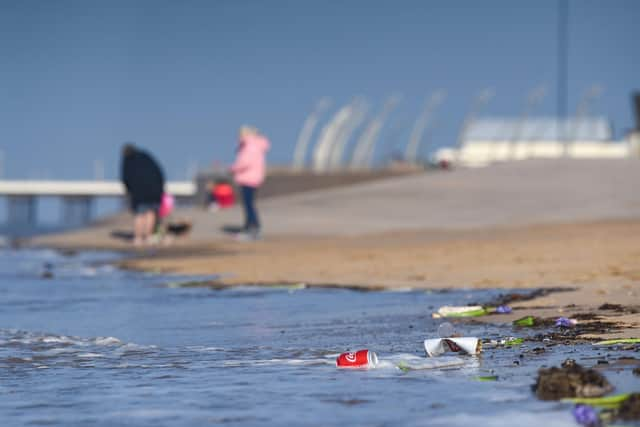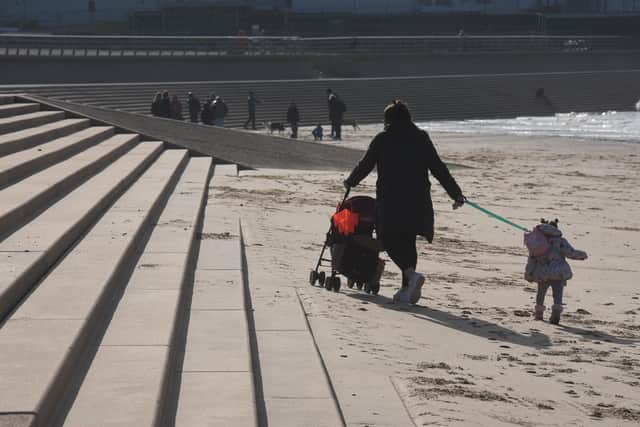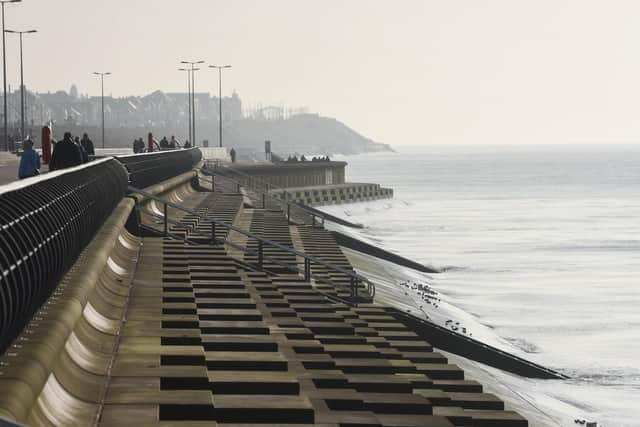'We all have a role to play' to stop climate change destroying our beaches
and live on Freeview channel 276
Changes in weather patterns, particularly increases in rainfall as a result of climate change, risk changes to our water quality by adding pressure to the sewer networks, environment group LOVEmyBEACH cautioned.
It came after Sir David Attenborough's alerted the UN security council last week to the threat of climate change, saying it was "the biggest threat to security that modern humans have ever faced."
Advertisement
Hide AdAdvertisement
Hide Ad"If we continue on our current path, we will face the collapse of everything that gives us our security: food production, access to fresh water, habitable ambient temperature and ocean food chains," the conservationist warned.


Increases in rainfall as a result of climate change means sewer networks reach capacity faster, and water companies are allowed to dump the excess in the sea to prevent homes from flooding.
A 12,000 cubic metre storage tank was built in April 2016 at Anchorsholme Park, which United Utilities said would help to reduce storm spills on the Fylde Coast by holding back five Olympic-sized swimming pools of water in heavy rain.
The water company spent five years on the £80 million project, building the underwater storage tank and a new storm water pumping station on the site.
Advertisement
Hide AdAdvertisement
Hide AdAnd in 2018, the utilities firm invested in a £35 million project to update an 80-year-old waterworks system which had been struggling to cope during times of heavy rainfall.


New pipes were laid under routes including Highfield Road and Midgeland Road, existing pumping stations including Lennox Gate were upgraded and an underground holding tank was built at Fishers Field to capture storm water.
But the Environment Agency estimated sewer overflows still led to around 30 per cent of sea pollution in the North West, with water quality along our coastline also affected by lots of other causes.
All Fylde coast bathing waters - from Fleetwood to St Annes - are currently rated as "good" by the Environment Agency, except Bispham which is rated "excellent," and St Annes North, currently "sufficient."
Advertisement
Hide AdAdvertisement
Hide AdA 2020 water quality report, by environmental charity Surfers Against Sewers, revealed United Utilities disposed of 486 loads of untreated sewer water into the sea off the Cumbrian, Fylde and Merseyside coasts last year.


United Utilities alerts the charity's Safer Seas Service each time a combined sewer overflow discharge (CSO) - the depositing of sewer water into the sea - happens.
Sewer water contains human waste - which in turn ends up in the sea, decreasing water quality, upping pollution and posing serious risks to human health.
A spokesman for United Utilities said: “Combined sewer overflows (CSOs) are an essential part of any sewer system. When the volume of rain flowing into drains is greater than the capacity of the pipes, sewers need to be able to spill that water safely back into the environment in a controlled manner via a CSO, otherwise it would cause flooding in communities. CSOs are consented by the Environment Agency to discharge only in certain conditions and within certain limits.
Advertisement
Hide AdAdvertisement
Hide Ad“However, we are not complacent, and all along the Fylde Coast and the Ribble estuary we have spent more than £700m over the last 25 years to reduce the incidence, volume and impact of spills.
"In south Blackpool we completed a scheme in 2019 to separate rainwater out of the combined sewer network.
"And last year we completed a major project at Anchorsholme Park which allows us to store five Olympic-sized swimming pools worth of stormwater to reduce the frequency of overflows. A new pumping station and longer outfall pipe means that any water that does overflow is cleaner and is dispersed further out to sea.”
Not only does sewer waste in the sea impact our health, it has potential to damage the reputation of seaside towns reliant on a strong tourism industry, LOVEmyBEACH explained.
Advertisement
Hide AdAdvertisement
Hide Ad"It will make it harder for beaches to achieve the highest classifications when bathing water quality is monitored by the Environment Agency," Emily Parr, Fylde Beach Care officer, said.
"Also, it will become harder for our beaches to achieve Seaside Awards. In turn this could decrease the reputation of the local coastline and therefore have an impact on our visitor economy.
United Utilities are investing in infrastructure improvements to ensure they are as prepared as possible and LOVEmyBEACH are working with various different partners to minimise the potential impact this increased rainfall/climate change will have."
Miss Parr, who works to maintain Fylde coast beaches and sees first-hand the effects of plastic pollution on our shores, urged residents to proceed with caution when investing in disposable items.
Advertisement
Hide AdAdvertisement
Hide AdThe summer months welcome an influx of visitors to Blackpool, who, along with residents, flock to the beaches for some fun in the sun.
Plastic buckets and spades, food containers and BBQs are all part of family days out - which is beneficial for the resort's tourism trade - but rarely for its beaches.
LOVEmyBEACH volunteers pick up discarded plastic on "each and every beach clean," posing risks to the safety of marine wildlife, and burning through energy at rates which severely increase carbon emissions.
"Much of what we collect is excessive waste and could be reduced," Emily continued.
Advertisement
Hide AdAdvertisement
Hide Ad"For example, in summer we pick up disposable BBQs, surrounded by plastic drinks bottles, food packaging, plastic cutlery and disposable plates.
"However, to produce, store, transport and sell all of these items has required a huge amount of raw materials and energy, therefore generating significant carbon emissions, furthering the impacts of climate change."
"We would urge everyone to reduce unnecessary waste where they can, every disposable item we use impacts on climate change.
"We all have a role to play in caring for our beaches, seas and climate."
Advertisement
Hide AdAdvertisement
Hide AdOver 1,000 plastic toys were collected from Blackpool beach last summer by volunteers from the Big Blackpool Beach Clean group, all of which were left on the sand by families enjoying the weather.
And in September, a survey conducted by charity The Marine Conservation Society found an increase in discarded PPE, with masks and gloves found on 30 per cent of beaches in the UK during a week-long beach clean event.